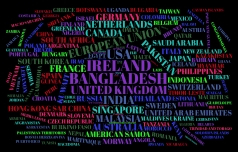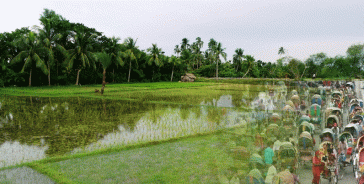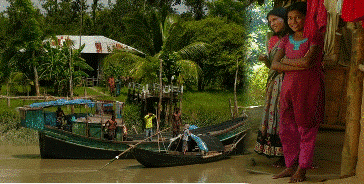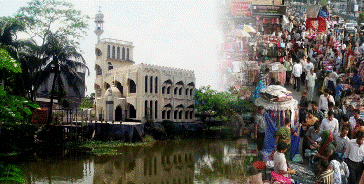I was listening to Elvis Costello last night who summed up a less than perfect year with the words:

 The only thing I have to say/It’s been a good year for the roses
The only thing I have to say/It’s been a good year for the roses
And while at the end of my year, I will (hopefully) be able to say that it was much more than just ‘a good year for the roses’, I have to be realistic and admit that it’s not always a bed of roses either. While it is interesting and exciting and indeed a privilege to be spending thirteen months in Bangladesh, there are times too when it is difficult and frustrating. And while I am naturally optimistic, there are days when I must fight to remain positive. Of course challenges and demands are part of everyday life everywhere. The difference here is that certain things can sometimes seem incomprehensible from within my own cultural frame of reference. So for me, it is not so much about adjusting to things like new food, new dress codes, new modes of travel, new climate, new workplace, new language, etc. The real challenge is in refocusing the lens through which I view and try to understand my new world, while negotiating the tricky terrain of cultural sensitivity.
Having travelled a lot, studied anthropology and engaged in training for this assignment, I felt well-versed in issues around ‘culture’ and ‘cultural sensitivity’. Furthermore, I enjoy and am confident and comfortable interacting with people from other cultures. However, this was my first experience of living and working in a very different culture for a prolonged period of time. I would have to combine my knowledge and awareness with the necessary skills and behaviour to engage at a deeper level, and build working relationships in a professional setting.
‘Difference’ is something I most often find interesting and intriguing – if not a little unusual at first. So, for example, during language learning (see post 11) we were eager to learn the words for ‘please’ and ‘thank you’ in order to engage in everyday activities. However, we were told that it was not commonplace in Bangladesh to use ‘please’ or ‘thank you’. Another example is the need to desist from giving a ‘thumbs up’ gesture here: it is viewed as obscene. Or, the rule that you always use your right hand to eat, receive or pass something, as the left one is considered ‘unclean’, given its use in bathroom ablutions. While shaking hands is not a universal greeting in Bangladesh, it is common, particularly in the city. However, I know too that for many pious Muslim men, shaking hands with a woman is not ‘permitted’. Apart from pondering the philosophy behind this, in my everyday life it is the uncertainty that I find disconcerting. When I introduce myself, or am being introduced formally, there are always clumsy moments: Will he? Won’t he? Even when a hand is offered, the handshake feels awkward. Sometimes the other person is responding out of cultural sensitivity towards me, which further complicates matters. A final example is the outward display of affection between men – especially younger men. This seemed strange to me at first in a country where homosexuality, and the public display of affection between men and women, is frowned upon. Every day I see young men walking hand-in-hand or sitting closely together in buses, arms entwined.
Most such cultural differences pose no real difficulty. It is the larger, more fundamental differences that can present challenges. I sometimes find myself tolerating situations or conversations that I am uncomfortable with. For example, I might come up against behaviour associated with the injustice and inequality perpetuated and justified by the hierarchical nature of society, such as the overt mistreatment of a ‘subordinate’ by a ‘superior’. Or, when in mixed company (say, for example, a group of volunteers) conversation may be directed exclusively towards my male colleague(s). Or, in my research team at work, the men often limit conversation to each other (I am the only female team member). If I am in a rickshaw or CNG with a male friend, he is asked for directions, even when it is I who know where we are going. There is the constant questioning in relation to my marital status (see post 22). Or, somebody might turn around in a bus and stare at me intensely and at close quarters for an entire journey. During those first months in Bangladesh I would keep quiet and hesitate to offer any contrary opinions, for fear of offending cultural sensibility. In a country where there has been so much unjustifiable interference from ‘outside’, I am constantly conscious of my role as an outsider. But by trying to be culturally sensitive, I was losing my own identity and suppressing my thoughts and feelings on issues that disturbed me deeply.
After a few months I realised that I was being overly sensitive in relation to cultural sensitivity! I had to figure out which aspects of my behaviour I needed to modify in order to live and work respectfully in this new culture. At the same time there were aspects of this culture that I felt I couldn’t let go unchallenged. But how could I be critically, rather than passively, culturally sensitive? If I wanted to live and work here I needed to engage with difference, rather than attributing every difference and difficulty to ‘culture’. ‘Cultural sensitivity’ was preventing me from reaching the deeper knowledge and understanding that I needed in order to live and work effectively here. I would never find ‘my place’ in this culture if I lived as though I was a stranger who had no place here. Yes, I was an outsider and thirteen months would not change that. But I had chosen to live and work here and I was actively and respectfully engaging in everyday life in so far as my limited language ability would allow. Therefore I needed to define my own identity within the culture.
The best way that I found of doing this was to deal with each situation as it presented, and each person individually. I discovered that speaking up, when my identity as a woman, as a professional or as a long-term resident in Dhaka was being challenged, would often diffuse an uncomfortable situation. Humour is a great way to challenge issues in a non-threatening way. Such exchanges continually prompt me to question my own levels of prejudice and tolerance too. Because viewing and trying to understand another culture also forces you to look inward. And that is often the greatest and most challenging exposure of all, because it goes towards the core of self-identity. I never seem to quite get there, but maybe there are no definitive answers: maybe the value lies in the questioning.
Apart from striving to understand and be understood, and the many other issues around cultural sensitivity, there are times when daily living in Dhaka is downright hard work. It can be like living in a vortex that sucks all energy from human bodies. At such times positive thinking deserts me. The biggest challenge for me by far is the almost impenetrable wall that is my work situation – see posts 25 and 48 for details in that regard. Sometimes, though, the challenges may not be that big at all: on the contrary, they might be laughably small. For example, the discomforts of daily life; the challenging dynamics of living arrangements; the failures of the postal system (at least one parcel and one letter – that I know of – have failed to reach me); the heat and humidity (see post 17); commuting and traffic jams (see post 7); the cockroaches and mosquitoes; the periodic sleep deprivation (see post 57); and people urinating, spitting or staring in the streets (see post 6). During visits to the Bagha Club (see post 10), I have had many conversations with other (paid) development workers living in Dhaka. Their conditions are immeasurably better than mine (e.g. modern air-conditioned apartments, cars with drivers, cooks, cleaners, security, etc.) and they are well-paid to boot. (I had visited the home of one such Irish worker shortly after I arrived – see post 7.) They continuously tell me that I am crazy to be living like this. When I attempt to explain the VSO philosophy behind trying to live as part of the local community (see post 2) , their response is: ‘But you are NOT a local, you are NOT Bangladeshi and your professionalism and health are being compromised by trying to be something you are not’. There have been many such arguments and I have to admit that there were days (though not too many thankfully) when I agreed with their assessments.
Apart from these everyday discomforts and annoyances, the problems of battling bureaucracy, attempting to cut through interminable reams of red tape, trying to get reliable information, or make arrangements (e.g. travel) can be endlessly frustrating. Trying to get directions or find a bus stop for a particular destination, for example, is well nigh impossible. I get wildly contradictory information in relation to opening hours, visa application procedures, train times, etc. It seems to me as if people pluck answers from the air in order to give some response. One example is my ongoing attempt to get a visa to travel to neighbouring Myanmar (Burma). After numerous treks to the ‘embassy’ (from which I was literally shooed away on a few occasions), I finally got to speak to a man through a hole in the wall beside a smelly open sewer (after insisting crossly that I would wait and keep shouting through the hole until somebody addressed me). (I had learnt that eloquent pleading had no swaying power here.) The huge gates to the lavish building were securely padlocked at all times. Somebody eventually passed me out the relevant forms which I took away, filled in carefully, got a colleague to co-sign and returned with the stated fee. Since then I have been unable to get any information about the status of my visa application, despite numerous visits (and stakeouts), letters, a letter in Bangla written for me by a colleague and a phone call by the same colleague. It now seems unlikely that I will get a visa, or any response, and there is absolutely nothing I can do about it. Though I’m not in the habit of giving up easily, it looks as though I’m beaten on this occasion.
There are times when I feel lonely here too. I meet a lot of people every day and have made some friends (see post 39). However, without the requisite linguistic ability, friendships can only go so deep. Without a family label, I am not easy to ‘identify’ in a hierarchical society like Bangladesh, where family is so important. I miss the ease of ‘belonging’; I miss the camaraderie of colleagues; I miss ‘hugs’ from friends. I am currently reading ‘The Road Home’ by Rose Tremain about the isolation of the immigrant experience, where she quotes John Steinbeck: ‘How can we live without our lives?’, from ‘The Grapes of Wrath’. This resonated with me. And yet, I think I am always aware, on some level, of the tragic isolation of the human condition – that innate aloneness that is, paradoxically, thrown into relief in crowds. And there is no better place for crowds than Dhaka. And while there are people everywhere you want to be, everyday and in huge numbers, nobody is hostile here (unlike some other countries that I have travelled in). The people I meet every day in Bangladesh are warm and welcoming, friendly and generous and I really have nothing to complain about.
Writing the last line of the above paragraph brings me to the crux of the issue. The annoyances and frustrations that I have outlined in this post pale into insignificance when compared to the annoyance I feel at myself, for feeling like I do at times. I never wanted it to be ‘easy’. How could I be fretting over a little discomfort, when many people around me are living in poverty that they have no chance of ever escaping (see post 30, for example)? How could I feel more concerned about cockroaches in my cupboard, than the horrifying reminders of my complicity in the global story of inequality and injustice? Such formidable ethical issues present struggles in themselves though: there are ever-present feelings of unease, guilt, dissonance, distress and sometimes even anger. Such feelings can lead to a spiral of despair, which in itself is unproductive and possibly self-indulgent too to a degree. Then there is the discord of trying to reconcile feelings of joy with all of these other mixed emotions. Because while Dhaka is not always a ‘nice’ place in which to live, it is also incredibly beautiful and joyful in so very many ways.
I am so happy that I can see the beauty, the humanity and the effortless art in my new locale without having to try. I see it every day in beautiful faces; in engaging smiles; in colourful fruit displays; in rickety rickshaws; in the conversations I have with ‘strangers’ on the street; in the spontaneous recitation of poetry; in the joy expressed when raindrops fall; in the children who descend on my CNG to beg; in the banter on the bus; in the scent of jasmine from a flower vendor’s garlands; in the camaraderie at tea stalls; in the architectural line of a mosque; in the fun I have with the lovely man in ‘my’ ironing shop; in the elegance and colour of the clothes women wear; and so much more. More than all of this I am humbled by the respectfulness of the Bangladeshi people who, in general, recognise and accept the fact that our cultures and standards differ, showing me no prejudice – attributes I aim to emulate. These, then, are the things that help me to cope with both the larger, personal challenges and the minor inconveniences and annoyances of living in Dhaka. These are just some of the things that make me glad and thankful to be here. Yes, indeed, it will be much more than just a good year for the roses.

 On March 15th 2009 I left Ireland to spend 13 months in Bangladesh as a
On March 15th 2009 I left Ireland to spend 13 months in Bangladesh as a 







 I am especially conscious that I am writing about an Eastern culture from the perspective of a Western observer. The opinions expressed are my own - unless otherwise stated. Should you perceive inaccuracy or misrepresentation, in this regard or in any other, or you would like to add something, I would welcome your observations. Leave a comment below the relevant post(s).
I am especially conscious that I am writing about an Eastern culture from the perspective of a Western observer. The opinions expressed are my own - unless otherwise stated. Should you perceive inaccuracy or misrepresentation, in this regard or in any other, or you would like to add something, I would welcome your observations. Leave a comment below the relevant post(s).
This is a really thoughtful post and expresses feelings of my experiences that I could not express as well as this. Thank you. Did you eventually get your visa for Myanmar? I don’t see a post on your travels there, so I’m think you may not have? Amara xx
Thank you for your lovely comment Amara. Your are right: I never got the visa for Myanmar so I had to cancel my plans. It was a very frustrating experience. Maybe I’ll consider visiting again in the future. Thanks again for getting in touch. Ann xx
If you ever decide to travel back to Bangladesh and/or India, Adab is a hand gesture which is used as a greeting by Muslims. 🙂 I hope you don’t have to experience any awkward handshakes again!
That’s interesting Nadiya. I’ve just googled it now. I didn’t come across it during the year. (Or could it be that I did but didn’t observe it?!) I wonder if it’s used widely in Bangladesh? In any case, the ‘awkwardness’ didn’t pose an unsurmountable problem. Thanks for commenting, Ann
Hi Ann
I arrived here unintentionally as an Elvis Costello fan. I stayed because you write so well. You perfectly and eloquently capture what it’s like to live in an alien culture (I lived in Japan for 3 years). This post would probably make no sense to someone who hadn’t lived in a very different culture for a prolonged period of time or made the effort to really try to ‘understand’. It sounds to me from this post as though you were definitely getting there. So I hope you didn’t give up. 🙂 It’s always worth it, right? To quote another Costello song: ‘What’s so funny bout peace, love and understanding’ (Ohhhhhhhh!!)
I’m going to read some more of your blog now … it’s good stuff.
Nuff said. Nick (in London)
Hello Nick (in London!)
Thank you for your lovely comment and apologies for the delay in replying. Yes, the post certainly forced me to tackle my thoughts on this subject. I’m still not sure if it’s ever really possible to fully ‘understand’ (in terms of trying to live through) another culture. Writing about that other culture poses problems too: there’s a fine line between arrogance and comprehension! But after spending three years in Japan you must know quite a bit about the subject too. I bet you have some great stories to tell. And yes, I agree: it’s always worth it. I spent a month travelling in Japan over 20 years ago (hard to write that!). For me it was incredibly interesting because it was the first time I experienced a non-Western culture. By the way, I presume you heard Bill Murray’s karaoke version of Costello’s ‘Peace, love and understanding’ in ‘Lost in Translation’?!!
Regards, Ann
Hi Ann
Ha! Hadn’t made that connection between Japan, Lost in Translation and Costello. Good one. 🙂
Yeah … lots of stories to tell but few interested people to tell them to. 😦
Would be interested to hear your thoughts on Japan.
I see you were in Nepal too (I was there in 2011). You could have been writing about my experiences there: a really great post. Makes the recent tragedies terribly real when you know places and people.
I’m going to read your post on India now because I’m thinking of going later this year.
Cheers, Nick
Hi again Nick
My experiences in Japan gave me much food for thought. I loved Japanese minimalism and how it extended so much more beyond architecture. I loved how it was connected to and reflected in Zen Buddhism. I learnt that less is often more. A Japanese friend might not rush to hug/kiss me, but a sincere bow could speak so much louder. I was also beginning to learn about the complexities surrounding social conformity and reactions against it. But I was only there for 1 month! I read ‘The Chrysanthemum and the Sword’ while I was there (as I’m sure you did too) and later, while studying anthropology, this was one of our prescribed texts. So for me, my time in ‘Japan’ had special significance. It was my first experience of non-Western culture; it was where I had my first introduction to an anthropological text (which I would later study but did not know at that time); and it was where I knew for sure that travelling was so central to my being!
Yes, words cannot express the shock and sadness I felt on hearing of the Nepal earthquake(s). And there was the tragic tsunami in Japan in 2011 too, which must have been very close to home for you.
I’m going to send you my e-mail address and if you have anything you want to ask about your forthcoming trip to India, we might take this conversation offline.
Regards,
Ann